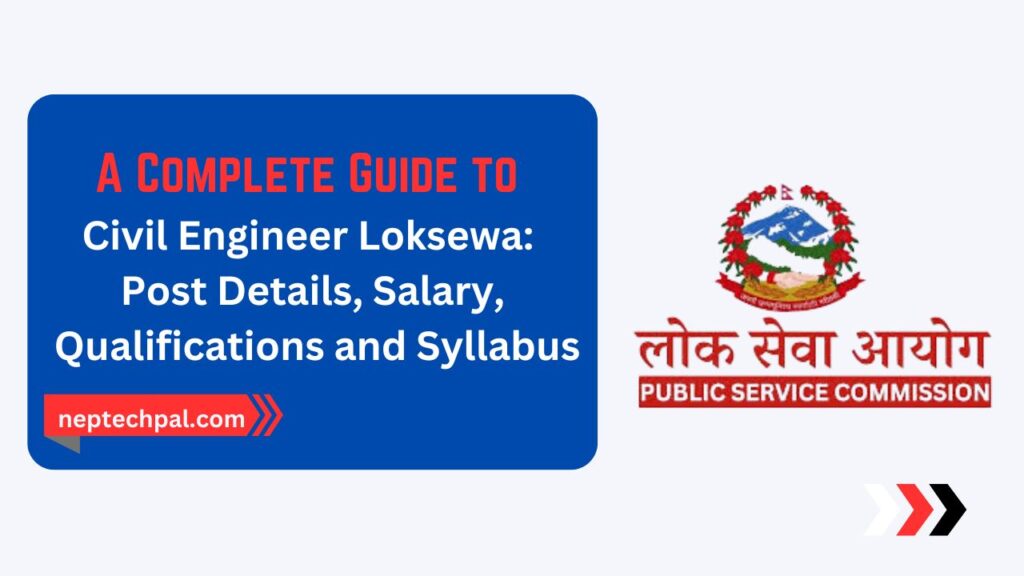
Civil engineering plays a pivotal role in building a nation’s infrastructure. Aspiring civil engineers in Nepal often dream of joining government services through the Loksewa Aayog (Public Service Commission) to contribute to urban planning, development projects, and infrastructure management. This blog’ll explore everything you need to know about civil engineer Loksewa, including post details, salary structures, qualifications, and the syllabus.
Why Choose Civil Engineer Loksewa?
Civil engineers in Loksewa get an opportunity to work on large-scale government projects such as roads, bridges, housing, irrigation systems, and more. The benefits include job stability, growth opportunities, and the chance to impact community development directly.
Post Details
Civil engineering posts in Loksewa fall under different categories based on their level of expertise and responsibility. These include:
- Engineer (Entry-Level): Typically responsible for assisting in the design, supervision, and maintenance of government projects.
- Rank: Non-Gazetted Class II (Sub Engineer) or Gazetted Class III (Engineer)
- Work Areas: Roads, bridges, irrigation, water supply, and other infrastructure projects.
Click here for download
- Senior Engineer: Involves advanced design, management, and supervisory roles.
- Rank: Gazetted Class II
- Work Areas: Project planning, implementation, and policy-making.
Click here to Download first paper(sanitory)
Click here to Download second paper(sanitory)
Click here to Download first paper(Irrigation)
Click here for Download Second paper(Irrigation)
Click here to Download first paper(Hydropower)
Click here to Download Second paper(Hydropower)
Click here to Download first paper(Highway)
Click here to Download Second paper(Highway)
- Chief Engineer: Strategic-level roles requiring oversight of multiple projects.
- Rank: Gazetted Class I
- Work Areas: Decision-making at departmental or ministerial levels.
Click here to download Frist paper(Mechanical)
Salary and Benefits
The salary of civil engineers in Loksewa varies according to the rank and grade. However, all employees enjoy benefits such as pension, gratuity, and allowances.
- Sub Engineer:
- Basic Salary: NPR 22,000 – 28,000
- Allowances: NPR 5,000 – 10,000 (travel, housing, etc.)
- Engineer (Gazetted Class III):
- Basic Salary: NPR 30,000 – 40,000
- Allowances: NPR 10,000 – 15,000
- Senior Engineer (Gazetted Class II):
- Basic Salary: NPR 50,000 – 60,000
- Allowances: NPR 15,000 – 20,000
- Chief Engineer (Gazetted Class I):
- Basic Salary: NPR 70,000 – 80,000
- Allowances: NPR 20,000 – 25,000
Additionally, government engineers receive health insurance, transportation facilities, and job security.
Qualifications
The qualifications for civil engineering posts vary based on the rank and nature of the position. The minimum criteria are:
- Sub Engineer:
- Education: Diploma in Civil Engineering (CTEVT or equivalent)
- Age: 18 to 35 years (general candidates)
- Engineer (Gazetted Class III):
- Education: Bachelor’s degree in Civil Engineering from a recognized university.
- Professional License: Must be registered with the Nepal Engineering Council.
- Age: 21 to 35 years (general candidates)
- Senior and Chief Engineer:
- Education: Advanced degree (preferred for higher posts) or equivalent professional experience.
- Work Experience: Several years in civil engineering roles.
- Age: As specified by Loksewa (often flexible for promotions).
Loksewa Syllabus for Civil Engineers
The Loksewa syllabus for civil engineers focuses on a blend of technical knowledge, general aptitude, and policy understanding. Below is a breakdown:
1. General Knowledge and Aptitude
- Nepalese History, Geography, and Culture.
- Current Affairs (Nepal and Global).
- Logical Reasoning and Numerical Ability.
- Administrative Structure and Constitutional Knowledge.
2. Core Civil Engineering Topics
- Building Materials and Construction: Properties and applications of materials.
- Structural Analysis: Load calculations, stability, and design principles.
- Geotechnical Engineering: Soil mechanics and foundation design.
- Water Resources Engineering: Hydraulics, irrigation systems, and water supply.
- Environmental Engineering: Waste management and pollution control.
- Transportation Engineering: Road design, traffic engineering, and maintenance.
- Surveying: Map preparation, leveling, and geospatial data handling.
3. Project Management and Policies
- Government project planning and execution.
- Sustainable engineering practices.
- Budgeting and resource allocation.
4. Practical and Software Skills
- AutoCAD for design and drafting.
- STAAD for structural analysis.
- Real-life problem-solving case studies.
5. Interview and Presentation Skills
- Scenario-based problem-solving.
- Communication and team management.
How to Prepare for Loksewa as a Civil Engineer?
Here are some tips to ace the Loksewa exam:
- Understand the Exam Format: Familiarize yourself with the syllabus and question types.
- Focus on Technical Knowledge: Prioritize subjects like structural analysis, surveying, and project management.
- Enhance General Knowledge: Stay updated on current affairs and administrative policies.
- Practice Mock Tests: Solve previous papers and time-bound mock exams to improve speed.
- Use Resources Wisely: Download to click here“Loksewa Tayari App – 2081” for access to mock tests, past papers, and tailored study plans to boost your preparation.
Conclusion
Joining Loksewa as a civil engineer is a prestigious career path that offers financial stability, professional growth, and the opportunity to make a significant impact on Nepal’s development. With the right preparation and dedication, you can secure a rewarding position and contribute to the nation’s infrastructure projects.
Are you preparing for the Loksewa civil engineering exam? Share your experiences and tips in the comments below!
